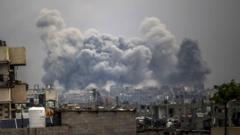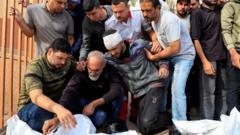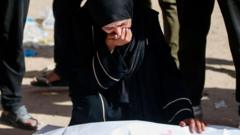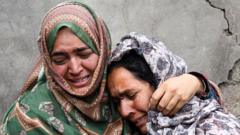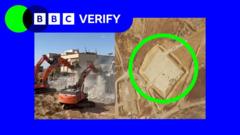As the Israeli blockade continues, families in Gaza face severe food shortages, with many children going to bed hungry. Reports from the region highlight the desperate measures residents are taking to feed their families amidst escalating military action and diminished aid.
Gaza Faces Dire Humanitarian Crisis as Families Struggle to Survive
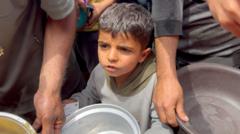
Gaza Faces Dire Humanitarian Crisis as Families Struggle to Survive
With food supplies dwindling, Gazans reveal their struggles as aid remains blocked and daily life becomes a fight for survival.
In a heartbreaking scene at a food distribution center in northern Gaza, six-year-old Ismail Abu Odeh pleaded for food as others rushed past him. With his bowl of lentils knocked away, he returned to his family’s tent in tears, only to find that the next day brought no deliveries of food or water to the displacement camp where they live, housed in a school in Gaza City. As the Israeli military intensifies its actions following over ten weeks of a comprehensive blockade, the United Nations warns that the region is edging towards famine.
The Israeli government contends that food scarcity is not a significant concern in Gaza, attributing the crisis primarily to Hamas allegedly hoarding and misusing aid supplies. They further state that halting aid is a strategy to apply pressure on Hamas and to secure the release of hostages, claiming that there are still 58 hostages in Gaza, with some believed to be alive.
Obtaining information from Gaza has proven challenging for international journalists, resulting in the BBC relying on phone calls and communications with local Palestinian freelancers. Residents have recounted the agony of tracking down even a single meal each day, with many food kitchens shutting down due to the lack of supplies and skyrocketing prices for remaining food items.
A local man running one of the few operational kitchens described his operations as a daily uncertainty, while another volunteer shared that their kitchen had closed due to depletion of resources just ten days ago, expressing a collective feeling of hopelessness. A 23-year-old woman from northern Gaza spoke about the constant dizziness and weakness she experiences from inadequate food and medical supplies.
Adham al-Batrawi, 31, who has been displaced from his home in al-Zahra, shared the inventive methods he has devised to cope with hunger, such as transforming overcooked pasta into a bread-like substance, noting that his makeshift meal is “far from enough” to sustain him and his family.
In central Gaza, nurse Rewaa Mohsen battles to care for her two small daughters amidst the escalating crisis. She has stockpiled essential items but fears running out soon. Her family has grown accustomed to the sound of explosions, prompting her to engage her daughters with drawing activities to distract them from the chaos. On a recent day, evacuation orders were issued for their area, and after an Israeli strike nearby, she returned to find her home in disarray, cautiously grateful for their survival.
Healthcare workers in Gaza report feeling increasingly endangered, with attacks on medical facilities exacerbating the already dire situation. A nurse shared the terror experienced as a hospital was struck by an airstrike, underscoring the risks faced by medical staff striving to care for their community during such tumultuous times.
Despite these harrowing circumstances, there are plans from the U.S. to introduce a new system for delivering humanitarian aid to Palestinians in Gaza, engaging private companies, a measure criticized by the United Nations as potentially politicizing aid. As residents like Ismail's father express their despair over their children's hunger, the humanitarian crisis in Gaza remains at a critical juncture, highlighting an urgent need for intervention and support.

